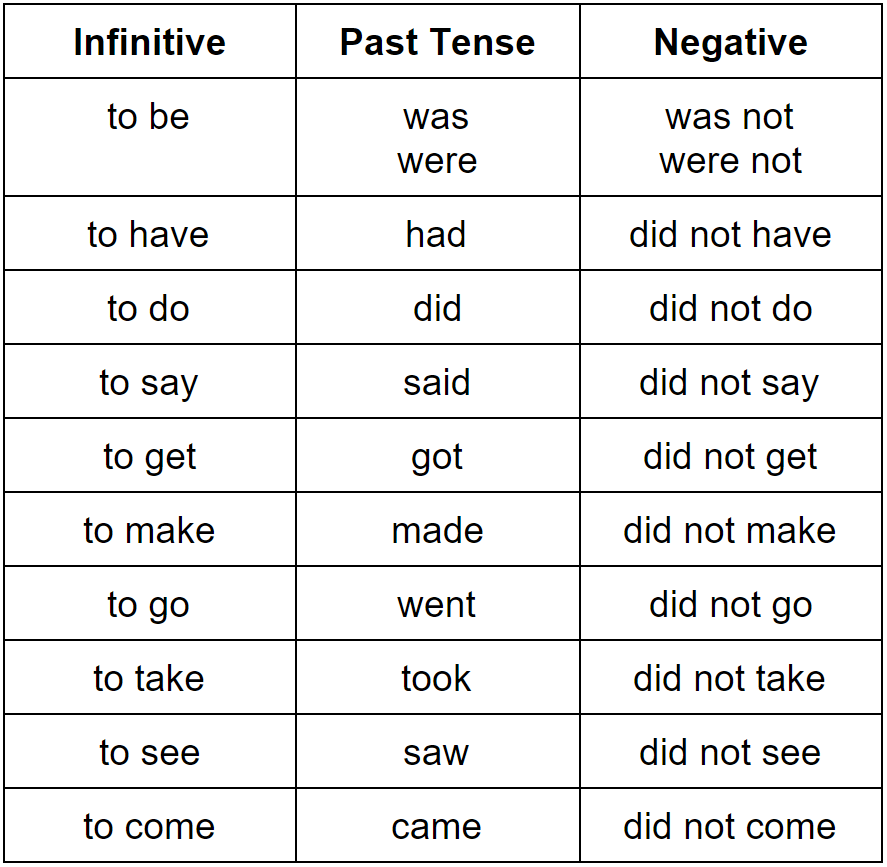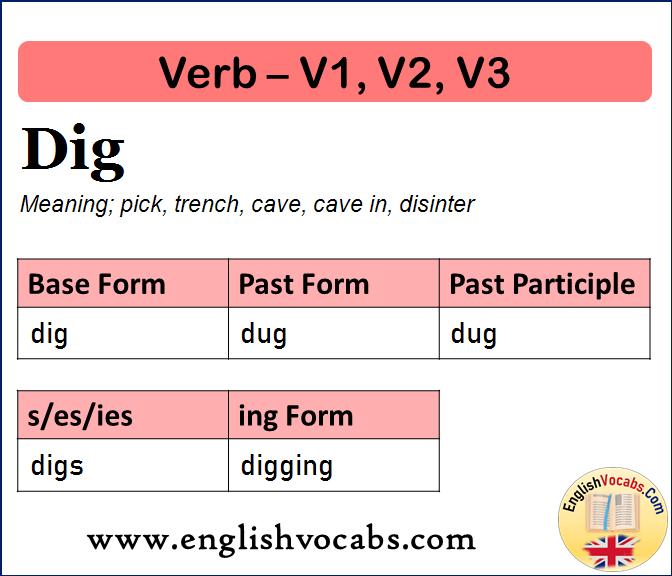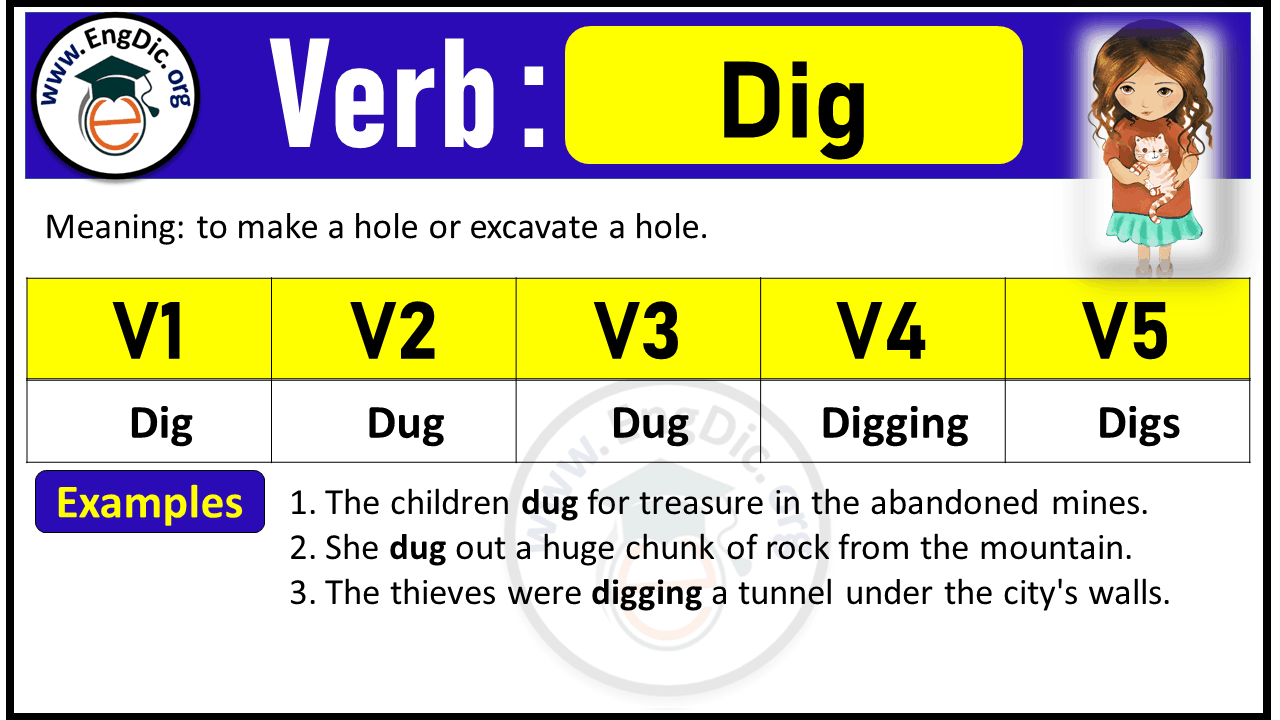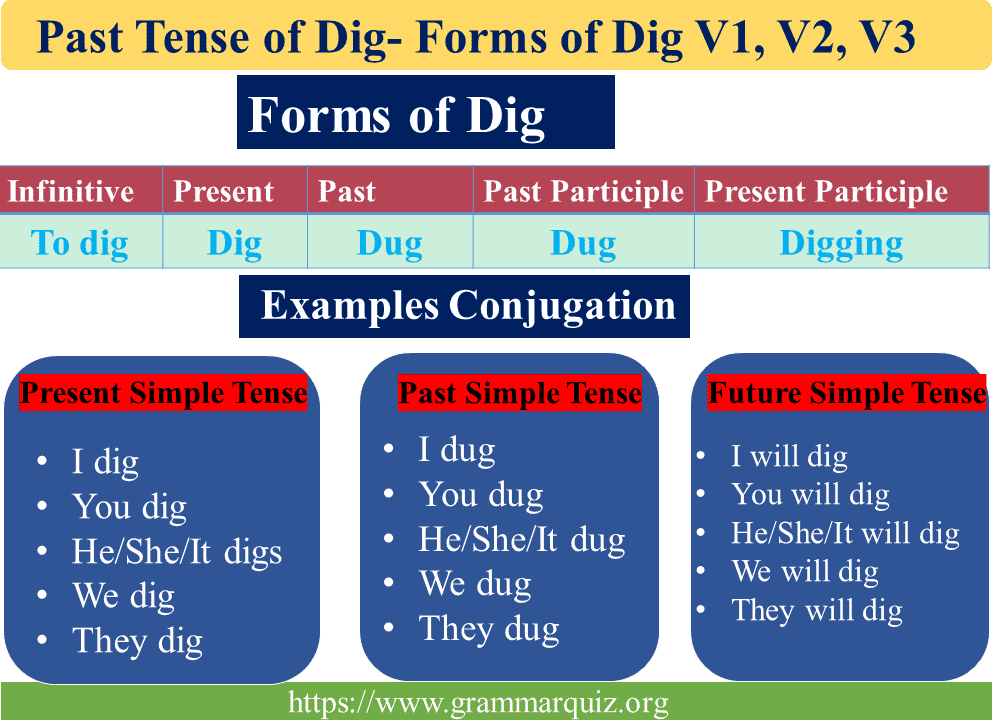
Dig Past Simple, Simple Past Tense of Dig, Past Participle, V1 V2 V3
The past tense of dig is "dug.". While many verbs form their past tense by adding "-ed" (e.g., talk -> talked, walk -> walked), irregular verbs like "dig" have unique past tense forms that do not follow this pattern. The past participle of dig is also dug. You just need to change the vowel -i into -u.

Past Tense Of Dig / Tenses Archives English Study Here For most
Irregular Verbs List Definition: To Dig Irregular verb: To Dig Verb conjugation: Dig - Dug - Dug Meaning of 'To Dig' To make a hole in the ground Conjugation of verb 'Dig' Irregular Verbs Following a Similar Pattern Verbs like: Subscribe to Ad-Free Browsing Enjoy a seamless learning experience without interruptions from advertisements.

Past Simple Tense (Simple Past) Definition, Rules and Useful Examples
Past simple of dig You are look at the page for irregular verb dig Past simple dug digged * [dʌɡ] [dɪɡd] * This form is obsolete or used only in particular cases or dialects. The past simple tense (sometimes called preterite, simple past or past indefinite) is the basic form of the past tense.

Simple Past Tense (Formula, Usage, Examples) PkDeveloper
Dig in Past Simple (Indefinite) Tense. Singular Plural; I dug: We dug: You dug: You dug: He/She/It dug: They dug: Dig in Past Continuous (Progressive) Tense. Singular Plural; I was digging: We were digging: You were digging: You were digging: He/She/It was digging: They were digging: Dig in Past Perfect Tense. Singular Plural; I had dug:

Dig Past Tense Verb Forms, Conjugate DIG
English Conjugate Irregular verbs dig Infinitive to dig Preterite dug Past participle dug Model : dig Auxiliary : have, be Other forms: dig oneself / not dig Contractions Advertising Indicative Present I dig you dig he/she/it digs we dig you dig they dig Preterite I dug you dug he/she/it dug we dug you dug they dug Present continuous I am digging

Dig Verb Forms, Past Tense of Dig, Past Participle of Dig, Dig V1 V2 V3
The past tense form is "dug" and past participle form is "dug." Understanding verb tenses The general grammar rules that govern past tenses are as follows. The simple past tense form is created by adding a -ed or -d affix to the root word of the verb. Some verbs use a -t variation where they end in a -t.

Conjugation Dig 🔸 Verb in all tenses and forms Conjugate in past
Infinitive: to dig Gerund: digging Past participle: dug Simple past: dug Irregular forms Auxilliary verb Spelling change Use contractions. Positive Negative. Indicative. Positive Negative. Present. I dig I dig: you dig you dig: he/she/it digs he/she/it digs: we dig we dig: they dig they dig:

Dig Past Simple, Past Participle, V1 V2 V3 Form of Dig English Vocabs
dig (third-person singular simple present digs, present participle digging, simple past and past participle dug or (archaic) digged) ( transitive, intransitive) To move hard-packed earth out of the way, especially downward to make a hole with a shovel. Or to drill, or the like, through rocks, roads, or the like.

the english past and present tense worksheet is shown in this image
V1: I love to dig in the garden on weekends. V2: He dug a hole in the sand to build a sandcastle. V3: They have dug up some fossils in the desert. V4: She was digging a trench for the water pipe. V5: The dog digs a hole in the backyard every day.

Past Tense Of Dig / Tenses Archives English Study Here For most
The past simple and the past participle of dig Conjugation of the verb dig: Base Form/Infinitive without 'to': dig Past Simple: dug Past Partciple: dug Present Partciple: digging Third Person Singular: digs Definition: To make a hole in the ground using a tool, a machine, or your hands. Example (s): The animal had been digging for food.

Past Tense Of Dig / Tenses Archives English Study Here For most
Verb Table for dig Continuous tenses Conditional Imperative Impersonal Simple tenses Present Past Present Perfect Past Perfect Will -Future Going to -Future Future Perfect Return to the dictionary Top of page Found an error? We appreciate your feedback. Click here! Continuous tenses Present Past Present Perfect Past Perfect Will -Future

Past Tense Of Dig / Tenses Archives English Study Here For most
Simple Past Tense: The -ING Form: digging: Present Participle Form: The Past Participle Form: dug [no alternative name] "To Dig" in All the Tenses The tables below show how "dig" conjugates in the past, present, and future tenses. Past Tenses. Person Simple Past Past Progressive Tense

Past tense of DIG Archives EngDic
Simple Past Tense He/She/It dug. I dug. You/We/They dug. Past Continuous Tense He/She/It was digging. I was digging. You/We/They were digging. Past Perfect Tense He/She/It had dug. I had dug. You/We/They had dug. Past Perfect Continuous Tense He/She/It had been digging. I had been digging. You/We/They had been digging. Simple Future Tense

Eat Verb Forms Past Tense, Past Participle & V1V2V3 » OnlyMyEnglish
Dig: 2. Simple Past: Dug: 3. Past Participle: Dug: 4. Present Participle: Digging: 5. 3rd Person Singular: Digs: Table of Contents. Dig past tense; Dig past participle; Dig verb forms V1 V2 V3 V4; Conjugation of Dig. More verb past tense; Dig past tense. Dug: Dug is the past tense of the word dig.

Verb 3 Dig Meteor
Dig Past Simple, Simple Past Tense of Dig, Past Participle, V1 V2 V3 Form Of Dig Advertisements When learning English you need to know the meaning of certain words first, and then sort the words appropriately according to grammatical rules.

Past Tense of Dig Forms of Dig V1, V2, V3
The simple past tense of "dig" is "dug." It is used to describe a completed action in the past. Here are some examples: I dug a hole in the garden yesterday. He dug a tunnel under the river. We dug up some old artifacts in the archaeological site. Past Continuous Tense The past continuous tense of "dig" is "was/were digging."